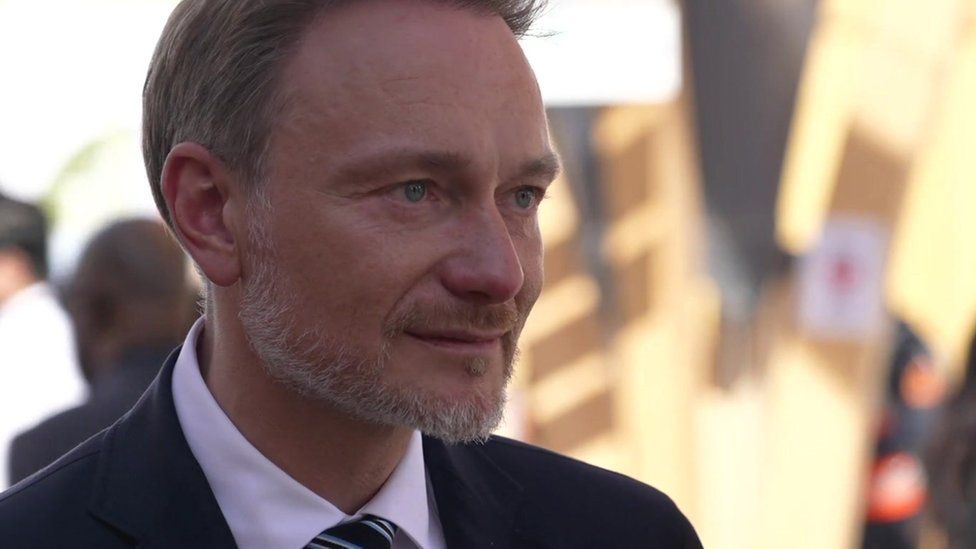
The German finance minister has extended a surprise invite to the UK to take “new steps” on post-Brexit trade relations with the European Union (EU).
In a BBC interview, Christian Lindner said: “If you want to intensify your trade relationship with the EU – call us!”
A government spokesperson said the UK was open to “new opportunities” across the globe.
Mr Lindner also said the German economy and energy supplies remain strong.
He is the leader of the German liberals, part of the ruling coalition led by the centre-left SPD of Chancellor Olaf Scholz.
During the discussion on the margins of the IMF and World Bank’s annual meetings in Marrakech, Mr Lindner said that the UK had a “standing invitation” on future talks aimed at reducing trade barriers, or “obstacles in daily business life” that had arisen.
“In the daily life of German corporates, there are new obstacles since Brexit… I don’t think [the] United Kingdom is benefiting from Brexit,” he told BBC News.
“We really appreciate the United Kingdom and its values, its people… and I would really, really appreciate it if we can intensify [the trade relationship] again,” he added.
According to the German Chamber of Industry and Commerce, German goods exports to the UK were 14.1% less in 2022 than in 2016 – the year of the Brexit referendum.
The UK slipped from third most important export partner to eighth. Combining trade both ways, the UK is no longer in the top 10 of German trade partners.
Car exports from the EU to the UK have nearly halved in number since Brexit, falling by €10bn (£8.6bn) in value.
German and British industry has complained about extra red tape – not just for goods exports but also for worker travel.
- A quick guide to what is in the Brexit deal
- Post-Brexit import checks on food delayed again
- UK rejoins EU science research scheme Horizon
- Progress on trade deals slower than promised
One of the most immediate new trade barriers could be an imminent imposition of tariffs on the trade of some electric vehicles, which do not qualify for the post-Brexit Trade and Co-operation Agreement with the EU.
Asked if he could help solve the issue, which is also a concern for German carmakers, Mr Lindner said that the UK is now a third party country.
This refers to any country outside the EU, and in this case outside its economic structures – the single market and the customs union.
Businesses in a third country have to fill in customs declarations, for example, when they import from and export to the EU – whether there is a trade agreement or not.
Mr Lindner said: “And so, if [the] United Kingdom decides for a special relationship with the European Union and our single market, you are invited… But at the moment, the United Kingdom decided for its own way and so these are these obstacles in the daily life. I regret it”.
A decision on the tariffs is expected by the end of the year.
Mr Lindner also held meetings with his UK counterpart, Chancellor Jeremy Hunt, in Morocco.
Conversations about reducing post-Brexit red tape could be seen as a fruit of the calmer relationship with the EU since the prime minister’s Windsor Agreement over Northern Ireland trade rules.
Labour Party leader Sir Keir Starmer is known to have developed a close working relationship with Chancellor Scholz, and now openly advocates renegotiating the Brexit deal to make it work.
A scheduled review of the post-Brexit deal is due in 2026, but Mr Lindner’s offer suggests that Germany is willing to move more quickly.
A Foreign Office spokesperson said: “The Trade and Cooperation Agreement is the world’s largest zero-tariff, zero-quota free trade deal. It secures the UK market access across key service sectors and opens new opportunities for UK businesses across the globe.”
They added that both the UK and EU have “publicly committed” to maximising the opportunities of that agreement.
Speaking more broadly about the German economy, Mr Lindner denied it was in weak shape.
“The German economy proved its resilience,” he said.
Germany entered recession earlier this year, as its industry was hit with the consequences of the surge in gas prices and the cut-off of Russian supplies following the invasion of Ukraine.
But he said Germany could reassure its European allies that it has diversified its energy supplies and filled up stores of gas, and had “solved the problem” of Russian gas imports.
Related Topics
- Germany
- International Monetary Fund (IMF)
- Economics
- Brexit
-
IMF defends gloomy UK forecast after criticism
-
3 days ago

-





